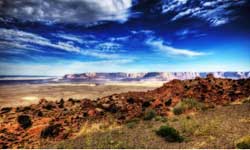 "So if anyone tells you, ‘There he is, out in the desert,' do not go out; ... do not believe it" (NIV Matt. 24:26).
"So if anyone tells you, ‘There he is, out in the desert,' do not go out; ... do not believe it" (NIV Matt. 24:26).
Given the prominent role that personal revelation is given in LDS doctrine and practice, it is surprising that there is little or no official support for spiritual retreats (in the desert or elsewhere) or even meditation. That was the odd conclusion I arrived at toward the end of Edward Abbey's Desert Solitaire: A Season in the Wilderness.
Abbey was a tree-hugger before it was fashionable. He took his wilderness in season-long chunks rangering in remote areas of Southern Utah, not, as you and I do, by way of well-planned and provisioned hikes of a few days or even a few hours. When he viewed a striking sunrise or transited a hushed canyon, he encountered (and wrote about) wilderness or Nature, but not God.
Are we any different? There are Christian traditions that press the devout to find God in the desert, whether by residence in remote monasteries or by visits and short-term retreats. But Mormons seek enlightenment by attending conferences; by engaging in personal scripture reading and prayer; and by visiting LDS temples, quiet places but not wilderness retreats and not even designed for lengthy reflections or meditation.
There are, of course, passages in LDS scripture that give support to the "God in Nature" view that somehow does not get expressed in LDS doctrine and practice. For example, the beautiful passage at D&C 88:45, 47:
The earth rolls upon her wings, and the sun giveth his light by day, and the moon giveth her light by night, and the stars also give their light, as they roll upon their wings in their glory, in the midst of the power of God.
Behold, all these are kingdoms, and any man who hath seen any or the least of these hath seen God moving in his majesty and power.
At 1 Nephi 19:12, the Spirit of God moves "kings of the isles of the sea" to exclaim, upon viewing violent storms and earthquakes: "The God of nature suffers." If the Spirit of God provokes the utterance, "God of nature" would appear to be a perfectly acceptable title for God, but I do not recall having heard Him so addressed in LDS prayers or hymns.
Less directly, in Alma 30:44 Alma tries to persuade Korihor that there is a God:
[A]ll things denote there is a God; yea, even the earth, and all things that are upon the face of it, yea, and its motion, yea, and also all the planets which move in their regular form do witness that there is a Supreme Creator.
Perhaps there are LDS leaders or writers who have taken up this theme, but to me it appears to be a road not taken in the modern LDS Church. Like Abbey, I don't see God's reflection in the snow-covered hills. Should I?
Dave Banack is an attorney living in Jackson Hole. He joined the Church of Jesus Christ of Latter-day Saints at age 15 and later served a two-year church mission to France and Switzerland. He has lived up and down the West Coast, as well as in Fiji, Samoa, Sweden, Utah, and now Wyoming. Dave has been running the Dave's Mormon Inquiry site discussing LDS and Christian issues since 2003. He is a website editor for Dialogue: A Journal of Mormon Thought and also participates at the Mormon weblog Times and Seasons.
This essay was originally posted at TimesandSeasons.org and is re-published here by permission.
9/16/2009 4:00:00 AM




